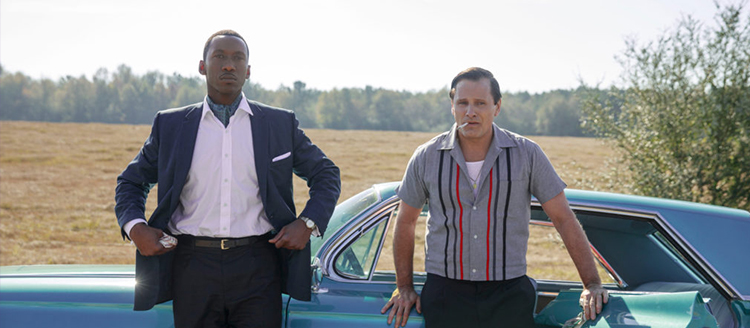Review: Green Book

Director: Peter Farrelly
Nominated for five Oscars including Best Picture, Acting and Original Screenplay
Green Book is showing at the Historic Theater on March 8th and 9th.
The film takes place in 1962 where we meet Copacabana bouncer and errand-boy Tony (Viggo Mortensen), who is newly laid off from work. After demonstrating himself as an all-around unpleasant and quite a racist man, he somehow is able to put his opinions aside to drive Dr. Shirley (Mahershala Ali) around for his 8-week tour. In what feels like a minute Shirley has scolded Tony for his smoking, the way he speaks, and his overall behavior. Tony pushes back as you would expect but they somehow manage to keep making it work. Tony goes from refusing to keep a glass his home a black man has drunk from into being personally offended when Shirley is denied entry to establishments.
The Green Book could have been a really interesting take on a black savant pianist doing a tour of the deep south with a white driver. The film could have looked at Dr. Don Shirley and admired him for all of his accomplishments. He first started playing piano for the public at 3 years old and traveled to Leningrad to study classically at 9. By his teen years, he played with some of the most prominent orchestras in the world. He abandoned his career and became a doctor of psychology before eventually returning and playing classically influenced jazz for the country. The film could have celebrated him; instead, this information is learned by just a few sentences in a passing scene. The film instead chooses to focus on the always eating, always cursing, fist throwing bouncer “Tony Lip” who Shirley hires to drive and protect him on his tour of the deep south. The screenplay is in part written by Tony’s son Nick Vallelonga, so we can’t be surprised that his father is the hero.
The performances, however, shouldn’t be overlooked. Mahershala Ali is subtle and delicate as Shirley. He carries himself with an air of self-confidence but is able to show with his eyes the inner turmoil of a far more complicated man. I walked out of the theater originally dismissing Viggo Mortensen’s performance. I thought “he was gross and unpleasant and I didn’t like him.” But then I remembered that those were all things Tony was—not Mortensen. In fact, he had done what few actors can do in my brain. I was able to forget that he was once a hero in The Lord of the Rings and a free-spirited father in Captain Fantastic. I thought of him only as Tony and that means the job was well done. Will you like his character? No. Will it be an effective performance? You bet. I would mention the other talented actors they hired—Linda Cardellini as Tony’s wife Delores, and Dmitri Marinov and Mike Hatton as Shirley’s band members—are all fine but are brushed to the side by the script, serving only to be vessels of information.
I wanted to like this movie and there are definitely enjoyable moments but the script focuses on the least interesting of the characters and creates too many questions. Why is Tony disgusted by a black man but perfectly willing to accept a gay man? Why is Shirley unfamiliar with popular music? Why does Shirley mention a strained relationship with his brother when that plot point leads nowhere? Two performances are strong and certain moments, such as when Shirley scolds Tony for hanging out with the fellow drivers (all black) when he could have been in performance, stating “they didn’t have a choice to be inside or out. You did”—a brilliant moment. Those moments, however, are few and far between and mostly are delivered in a stern voice with perfect diction by Ali. The title comes from an actual book that listed safe establishments for black travelers to stay in the southern states. Much like many characters and plot points in this film, it is a side prop that is glanced at occasionally but not fully appreciated.
